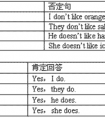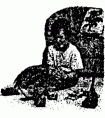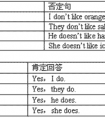用括号中所给词的适当形式填空。1. I eat three _____________ (tomato). 2. The beef _____________ (be) too salty. 3. That _____________ (sound) good. 4. Amy -五年级英语
他在战争爆发之前逃离欧洲。
注意:could有时不表示时态
1.提出委婉的请求,(注意在回答中不可用could)。例如:
Could I have the television on? 我能看电视吗?
Yes, you can. / No, you can't. 可以/不可以。
2.在否定句、疑问句中表示推测或怀疑。例如:
He couldn't be a bad man. 他不大可能是坏人。
比较may和might:
1.表示允许或请求;表示没有把握的推测;may 放在句首,表示祝愿。例如:
May God bless you! 愿上帝保佑你!
He might be at home. 他可能在家。
注意:might 表示推测时,不表示时态,只是可能性比may 小。
2.成语:may/might as well,后面接不带to 的不定式,意为"不妨"。例如:
If that is the case, we may as well try.如果情况确实如此,我们不妨试一试。
比较have to和must:
1.两词都是“必须”的意思,have to 表示客观的需要,must 表示说话人主观上的看法,既主观上的必要。例如:
My brother was very ill, so I had to call the doctor in the middle of the night.
弟弟病得很厉害,我只得半夜里把医生请来。(客观上需要做这件事)
He said that they must work hard.
他说他们必须努力工作。(主观上要做这件事)
2.have to有人称、数、时态的变化,而must只有一种形式。但must 可用于间接引语中表示过去的必要或义务。例如:
He had to look after his sister yesterday. 他昨晚只得照顾他姐姐。
3.否定结构中:don't have to表示"不必",mustn't表示"禁止"。例如:
You don't have to tell him about it.你不一定要把此事告诉他。
You mustn't tell him about it.你不得把这件事告诉他。
比较shall和should:
1).shall 用于第一人称,征求对方的意见。
What shall we do this evening?
2).shall 用于第二、三人称,表示说话人给对方的命令、警告、允诺或威胁。
①. You shall fail if you don’t work hard.(警告)
②. He shall have the book when I finish it.(允诺)
③. He shall be punished.(威胁)
will和would的用法:
1.表示请求、建议等,would比will委婉客气。如:
Would you pass me the book?
2.表示意志、愿望和决心。如:
I will never do that again.
They asked if we would do that again.
3.用“will be”和“will(would) + have + 过去分词”的结构表示推测,主要用于第二、三人称。
前者表示对目前情况的推测,后者表示对已经完成的动作或事态的推测。如:
This will be the book you want.
He will have arrived by now.
The guests would have arrived by that time.
I thought you would have finished this by now.
4.will表示习惯、请求,固有性质等。
Everyday he will sit here hour after hour doing nothing.(习惯)
Will you help me with my English?(请求)
The door won't open. (固有性质)
5.Would可表示过去反复发生的动作或某种倾向。
Would表过去习惯时比used to正式,并没有“现已无此习惯”的含义。如:
The wound would not heal.
During the vacation he would visit me every week。
6.表料想或猜想。如:
It would be about ten when he left home.
What would she be doing there?
I thought he would have told you all about it.
情态动词用法口诀:
情态动词两特点,动词原形接后面,说话语气较委婉。
can"能力"may"许可",must"责任"或"义务"。
否定回答needn’t换,"需要"need,dare"敢"。
should"应该",would"愿",haveto"被迫"表客观。
can, could, may, might, must 皆可表示推测,其用法如下:
1)情态动词+动词原形,表示对现在或将来的情况的推测,此时动词通常为系动词。例如:
I don't know where she is,she may be in Wuhan.我不知道她在哪儿,可能在武汉。
2)情态动词+动词现在进行时,表示对现在或将来正在进行的情况进行推测。例如:
At this moment,our teacher must be correcting our exam papers.这时,想必我们老师正在批改试卷。
3)情态动词+动词完成时,表示对过去情况的推测。例如:
The road is wet.It must have rained last night.地是湿的,昨天晚上一定下雨了。
4)情态动词+动词的现在完成进行时,表示对过去正在发生事情的推测。例如:
Your mother must have been looking for you.你妈妈一定一直在找你。
5)推测的否定形式,疑问形式用can't,couldn't表示。例如:
Mike can't have found his car,for he came to work by bus this morning.
迈克一定还没有找回他的车,因为早上他是坐公共汽车来上班的。
注意:could,might表示推测时不表示时态,其推测的程度不如can,may。
考点名称:一般现在时,动词单数第三人称
一般现在时:
表示现在经常反复发生的动作、存在的状态或习惯性的动作的时态。可概括为
①经常性或习惯性动作;
②长期存在的特征或状态;
③普遍真理、客观事实等。
构成:
一般现在时用行为动词的原形,但第三人称单数作主语时,动词的词尾要加-S。
a. 表示经常性或习惯性的动作。
例:Li Ming always helps the old man. 李明一直帮助这位老人。
We usually go to school on foot. 我们通常步行上学。
They sometimes go fishing on Sundays. 他们有时周日去钓鱼。
b. 表示永恒不变的事实或真理。
例:A bird flies with wings. 鸟用翅膀飞翔。
c. 用在格言、谚语中。
例:Pride goes before a fall. 骄者必败。- 一般现在时具体用法:
1.表示经常的或习惯性的动作,常与表示频率的时间状语连用。
时间状语:
always,usually,every morning/night/evening/day/week/year,often,sometimes,
occasionally,from time to time,twice a week,rarely,seldom,once a month,hardly,ever,never.
e.g: I leave home for school at 7:00 every morning.
2.表示主语具备的性格、能力、特征和状态。
e.g:I don't want so much.
Ann Wang writes good English but does not speak well.
比较:Now I put the sugar in the cup.
I am doing my homework now.
3.表示客观事实和普遍真理。
e.g :The earth moves around the sun.
Shanghai lives in the east of China.
4.在时间状语从句和条件状语从句中,常用一般现在时代替将来时。
5.表示预先计划或安排好的行为。
6.小说故事用一般现在时代替一般过去时。新闻报道类的内容,为了体现其“新鲜”性,也用一般现在时来表示过去发生的事情。
7.有些表示状态和感觉的动词表示现在发生的具体行为时,只用一般现在时,而不用进行时态。
8.表示现在发生的具体动作或存在的状态
9表示格言或警句中。 e.g Pride goes before a fall. 骄者必败。
注意:此用法如果出现在宾语从句中,即使主句是过去时,从句谓语也要用一般现在时。
例:Columbus proved that the earth is round..
第一句用一般现在时,用于操作演示或指导说明的示范性动作,表示言行的瞬间动作。
再如:Now watch me,I switch on the current and stand back.
第二句中的now是进行时的标志,表示正在进行的动作的客观状况,所以后句用一般现在时。 - 一般现在时用法表:

第三人称单数的构成见下表:





![Therabbitlikes_________.[ ]A.bonesB.chickenC.fishD.vegetables-四年级英语](http://www.00-edu.com/d/file/ks/4/1/9/2019-08-12/small19d909f6c152d7dbd99050270d09dd701565564237.gif)
